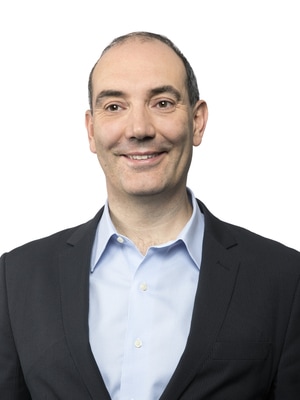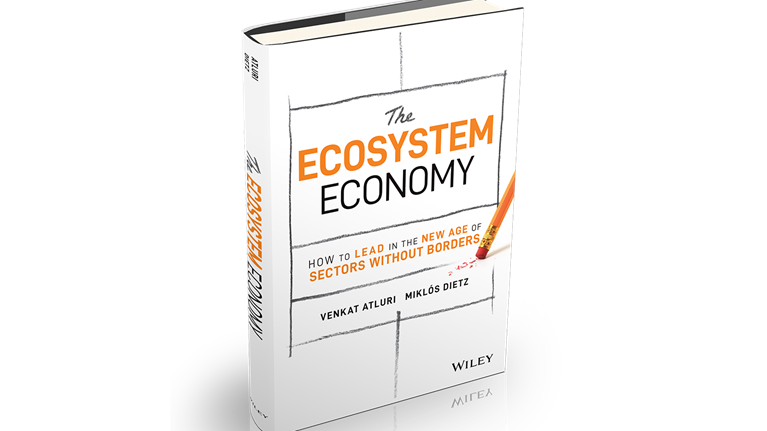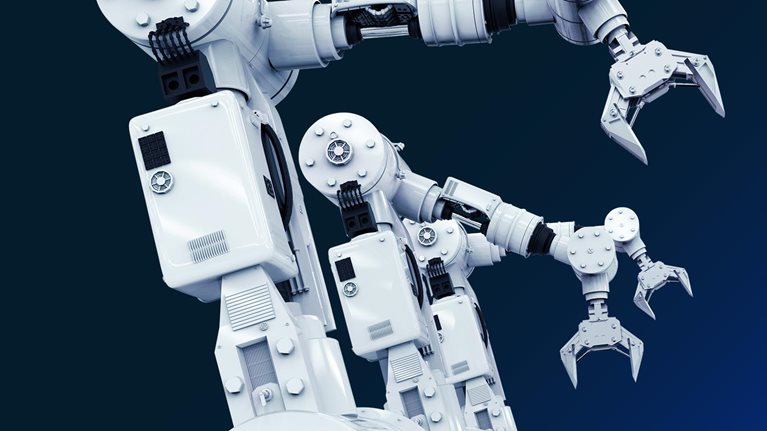In this edition of Author Talks, McKinsey Global Publishing’s Charles Barthold chats with McKinsey senior partners Venkat Atluri and Miklós Dietz about their new book, The Ecosystem Economy: How to Lead in the New Age of Sectors Without Borders (John Wiley & Sons). With traditional sector barriers breaking down, Atluri and Dietz project that one-third of global GDP will soon come from ecosystems—or networks of organizations across different sectors. To survive the coming transformation and get a piece of $80 trillion in revenue potential, companies will need a playbook for cross-industrial strategy. An edited version of the conversation follows.
Why did you write this book, and why now?
Venkat Atluri: We have been doing work on the topic of ecosystems almost for 15 or 20 years now. As we were doing the work and delivering impact for our clients, we realized that the broader topic of ecosystems is truly changing the way in which the economy is evolving globally.
By serving clients and doing a bunch of primary and secondary research, we found that there are lots of great perspectives we could offer in a very practical way to our clients that could make a big difference. That’s the reason why we decided to write a book. If you look at the progression of how ecosystems have influenced the way the economy has evolved, it’s gotten to a tipping point in the last five to ten years or so. We thought this would be a perfect time for us to take our learnings and write something that could be practical and useful for the community at large.
Miklós Dietz: This is the single largest economic transformation in the history of the planet. For ten thousand years, everything—the whole economy—was organized across traditional industry lines, and now it’s breaking up. It’s getting reorganized across customer needs.
This is the single largest economic transformation in the history of the planet. For ten thousand years, everything—the whole economy—was organized across traditional industry lines, and now it’s breaking up. It’s getting reorganized across customer needs.

This is a topic with a scale of tens of trillions of dollars of value being shifted. This is a fascinating change for practically every company in the world. They have to rethink how they run their business and how they think about strategy. We wrote this book now because this whole transformation has reached a magical inflection point.
Certainly the way that COVID accelerated digitalization has helped. We’ve gotten to a moment now when we see that leaders in every major industry are thinking about ecosystem. They are thinking about platforms. They are thinking about cross-industry value propositions. This is the moment that this change has reached critical mass.
What is a business ecosystem?
Miklós Dietz: We try to capture it in the book, but the best way to explain it is by noting the extent to which it is different than traditional business. We believe traditional businesses are focusing on one value proposition for one type of client across one value chain, while ecosystems cut across industries and across value chains.
[Ecosystems] are partnering with other companies from very different sectors to create a truly integrated customer journey.
Venkat Atluri: Take, for example, the rideshare community: The whole ecosystem is based on two or three players by region developing a platform that everybody—the drivers in that community and the consumers using that service—uses as an ecosystem partner.
That’s a very good example because it shows how a community of, in this case, digital assets can come together to deliver better value, better convenience, and more cash back to the community being served. It can also provide livelihoods for many people that want to drive and make a living in a part-time situation.
What is an example of customer centricity?
Miklós Dietz: People don’t want a mortgage. They don’t want home insurance. They don’t want a real estate agent. They want a home. Of course, historically and traditionally, we have forced people to go to six different places to line up and fill out hundreds of pages.
Our belief is that the future is about delivering what people need: if you need a home, you will basically only need to find one process through which you can find the right place, get it financed, move in, renovate, and even sell it—all in one glorious and integrated journey.
Small businesses, for example, right now are forced to get their administrative services from one player, legal from another, banking from another, and telco from another. All of these are necessary evils for running their core business. The moment somebody offers them an integrated way, one gateway to get all of these services in one seamless form, they love it. This this is true customer centricity: actually solving the customer’s problem of needing to cross sectors.
What is the first step for clients on the journey to an ecosystem economy?
Venkat Atluri: The first step that we would like our clients to take is to start with where they want to play in the new emerging ecosystem economy.
Miklós Dietz: First and foremost, this is a choice for every company: where they want to be on that [scale]. An orchestrator is an amazingly exciting and highly ambitious role. It is to be the player who connects all the dots, brings in all the partners, and owns a customer journey from beginning to end. That’s one extreme.
Another extreme is to be the humble but still very successful and profitable participant who plays one well-defined and important role, using that and the broader ecosystem to access customers and build economies of scale.
We believe most players need to be somewhere in between. This is a very careful, thoughtful, complex, and frequently iterative process: the way we realize where on this scale companies need to line up. It has been my experience that many clients typically want to start on the orchestration end, which consists of constant customer exposure, testing, piloting, and learning from the institution or individual customers to evolve into their natural role.
Most ecosystems will not be ruled by one gigantic company. This is not what customers want. This is not what stakeholders or regulators want. Most ecosystems will be orchestrated by a partnership with partners of very different roles. It is a multifaceted, multidimensional dance and choreography through which they find their natural roles.
Venkat Atluri: When we talk to our clients and look at the work we have done, it is not only exciting to be an orchestrator—it’s also extremely difficult to be an orchestrator. The reason for this is that, in most cases, you need to have a very robust platform on which you build an ecosystem, whether it’s physical or digital.
We don’t need ten orchestrators in a given ecosystem. We may need one, two, or three. That’s the other thing you need to keep in mind when you’re picking a role: “Am I too late? Am I one of the three, or am I one of the ten?
If you don’t have the platform, you cannot be an orchestrator, but having a platform itself doesn’t give you the right to be an orchestrator. You also have to have the vision, the support, and the wherewithal to evolve the platform in a way that is sustainable for a long time to come.

Going back to the example about ridesharing: the rideshare platform owner not only has to maintain the platform but they also have to evolve it. Competition is coming at them in different ways, so the platform owner has to have the right mindset, aspiration, and vision to develop the platform and evolve it to be sustainable. If you don’t have that, you’re not going to be a successful orchestrator.
We don’t need ten orchestrators in a given ecosystem. We may need one, two, or three. That’s the other thing you need to keep in mind when you’re picking a role: “Am I too late? Am I one of the three, or am I one of the ten?” Then, you have a difficult decision to make.
What kind of reaction have you gotten to the book so far?
Venkat Atluri: The reaction we’ve gotten is that it is extremely insightful, especially in how we think differently about competition. To the earlier point we were discussing, you can’t think only in terms of your own sector.
The sector borders are blurring. Players are cutting across sectors. It’s not about sectors anymore—it’s about what customer need you are trying to fulfill. What proposition do you have? How do you offer that proposition, and not just from what you have but also from what else you can bring together?
Miklós Dietz: The reactions we have gotten so far are, I would say, excitement and a bit of worry. The excitement part is about how most leadership understands that there is a tremendous amount of transformation going on. They understand that their companies and potentially hundreds of years of history which are embedded in millennial-old traditional sectors are now being shaken.
Most companies are aware that essentially all of the leading large companies in the world by now are cross-industrial. In the past few years, $8 trillion of new shareholder value has been generated by cross-industrial players, frequently at the expense of traditional industry players.
Essentially all of the leading large companies in the world by now are cross-industrial. In the past few years, $8 trillion of new shareholder value has been generated by cross-industrial players, frequently at the expense of traditional industry players.
Most companies are aware that this is happening. I think they are excited that somebody is taking a step back and looking through a cross-industrial, multi-decade lens and trying to push the thinking beyond just what your mousetrap should be in the next one or two years.
The other feeling is, obviously, some kind of worry because parts of what we are saying are quite intuitive. So far, the most frequent questions we got were around organization: “OK, we get it. We need to do this. It’s intuitive, it makes sense, and we already see three competitors and four other global players making hundreds of billions of dollars with it, but how do we do it? Where is it in the organization? Who should be responsible? Do we need to hire new people? Should we buy somebody? Should we do something quickly?”
People have a natural bias toward action, which is wonderful, but I would argue that the ecosystem is one of the few topics where it actually makes sense to take a step back and think through where you are going first. This is not a one-year or two-year tactical move. This is a decades-long strategy choice. You have to make serious, thoughtful choices.
There seems to be a lot in play here—what’s at stake?
Miklós Dietz: We have been trying to model how the global economy is transforming and how much of the value is shifting from traditional sectors to this cross-sectoral ecosystem logic. We are expecting that by 2035, around one-third of the global GDP—which would be more than half of the distribution part of the GDP—will actually be orchestrated by cross-industrial ecosystems.
That amounts to as much as $80 trillion of revenue potential, which, in shifting into this new format, would mean several trillion dollars in extra profit shifting. To some extent, global capital markets are already betting on this.
The enormous valuation increase of cross-industrial companies, even after the recent correction, is very visible. Over the past two years, $8 trillion has moved into ecosystem players. The markets are assuming and expecting to see early moves to grab a large part of this future value, because in this new ecosystem, the magic is not market share anymore—it’s customer ownership.
Whoever owns the customer will capture the value, and the key weapon in this war is data. Whoever has the best data will own the customer. There is a lot of excitement and a lot of energy about companies who are well positioned to win here.
Venkat Atluri: There are pretty large numbers that are mind-boggling in terms of value at stake. I’ll also make it a bit more practical. The value at stake is that if you are a traditional business, you are either going to survive in this ecosystem economy or somebody will come in and take away the value you provide with their digital or physical platform.
Without naming big names, online players are encroaching on every sector that they can get their hands on. What do they have? They have a platform. They use the platform to create value. What else do they have? They have a way to own the customer and offer what they want.
The value at stake is that if you are a traditional business, you are either going to survive in this ecosystem economy or somebody will come in and take away the value you provide with their digital or physical platform.
The value at a macroeconomic level is big numbers, but as an individual company, the value comes down to whether you are going to survive in this onslaught. We believe that if you apply the ecosystem thinking we talk about in the book, the chances of you surviving are much higher.
Miklós Dietz: Companies make extra profit and make shareholder value because they are able to differentiate themself. Today, that differentiation is still mainly within the sector. In the future, to differentiate yourself, you will have to create a truly differentiated cross-sectoral journey.
As a company, you will only be able to create extra profit if you are meaningfully, differently serving a fundamental need of a customer. That can only be possible in a cross-sectoral journey, because customer needs don’t follow traditional industry lines. Therefore, for the future of extra profit—whether it’s at the scale of trillions for the whole country or at the scale of hundreds of millions for an individual company—the question is, “Can I be the one who can create the best cross-industrial value proposition?”
Watch the full interview



